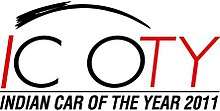Indian Car of the Year
The Indian Car of the Year Award (ICOTY) is presented annually to the best new car launched in India, and is based on similar other awards such as European Car of the Year. The award was established in 2006, with the Maruti Suzuki Swift winning the first award[1] and the Hyundai Venue winning the latest award in 2020.[2]
| Indian Car of the Year | |
|---|---|
 | |
| Website | www |
The voting jury consists automobile journalists from all over India. Each jury member has a maximum of 25 points, where each member can allot a maximum of 10 points to one car. And every Jury member must give points to at least 5 of the contending cars.
Hyundai has won the award six times, while Maruti Suzuki four times and Honda have won twice. Swift is the one and only car that got this award thrice. Most of the award winning cars have been from Japanese or Korean manufacturers, and are available globally in the same or different guises.
The Hyundai Elite i20 and i10 Grand, for instance, are available in Europe and Japan. The European Renault Duster developed by the Renault engineers, sold worldwide and built in India yet got this award for 2013. The Maruti brand on Suzuki models is exclusive to India. The Honda City is largely restricted to Asian and South American markets, while the Ford Figo is a modified version of the Ford Fiesta that was sold in Europe from 2002 to 2008. The Honda Civic is a global model, although not all versions are sold on every market.
Results
| Year | Winner |
|---|---|
| 2006 | Maruti Suzuki Swift |
| 2007 | Honda Civic |
| 2008 | Hyundai i10 |
| 2009 | Honda City |
| 2010 | Tata Nano |
| 2011 | Ford Figo |
| 2012 | Maruti Suzuki Swift |
| 2013 | Renault Duster |
| 2014 | Hyundai i10 Grand |
| 2015 | Hyundai Elite i20 |
| 2016 | Hyundai Creta |
| 2017 | Maruti Suzuki Vitara Brezza |
| 2018 | Hyundai Verna |
| 2019 | Maruti Suzuki Swift |
| 2020 | Hyundai Venue |
See also
References
- "Swiftly making history". Business Standard. 6 May 2006. Retrieved 3 March 2014.
- "India Car of The Year (ICOTY)". ICOTY (Indian Car Of The Year). Retrieved 19 December 2019.